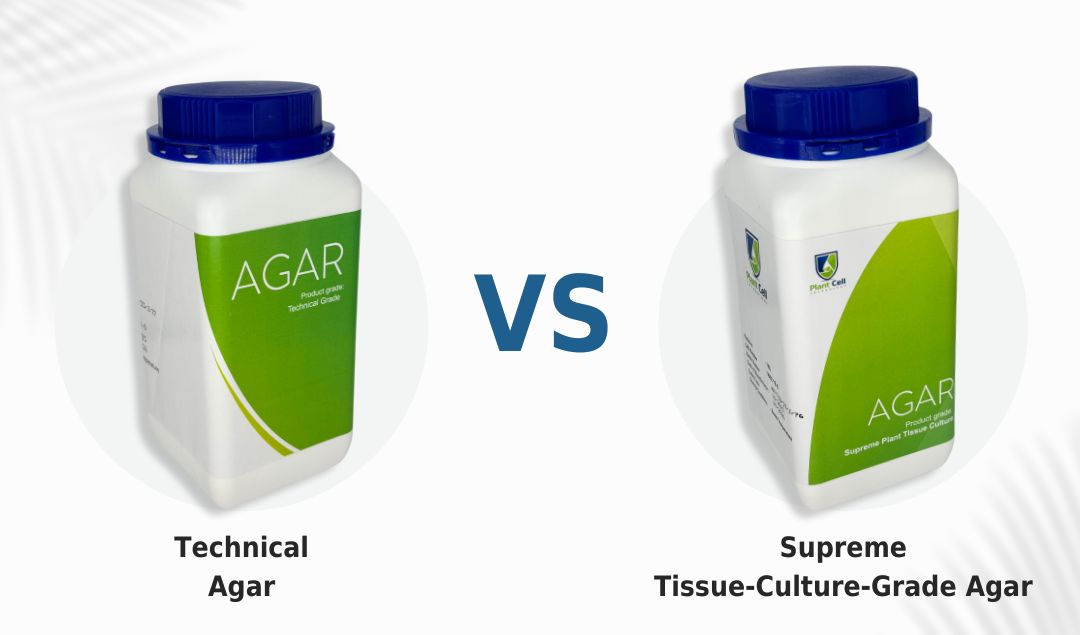
Can Microorganisms Be Used in Plant Tissue Culture?
As a content and community manager, I leverage my expertise in plant biotechnology, passion for tissue culture, and writing skills to create compelling articles, simplifying intricate scientific concepts, and address your inquiries. As a dedicated science communicator, I strive to spark curiosity and foster a love for science in my audience.


Not all microbial forms are dangerous for the health of plants. Some f them are in natural condition, and involved in the growth and development of plants. They play vital roles in diverse ecosystems such as nitrogen fixation, solubilization, water uptake, and transport of minerals from the soil to the plant. These microbes are known as Plant growth promoting microbes (PGPMs).
We talk about microorganisms contaminating our tissue culture plants. But, what if I tell you that a few microbial species can be useful for your tissue culture plants too!
Confused?
Let me explain it to you in a bit more detail.
Not all microbial forms are dangerous for the health of plants. Some f them are in natural condition, and involved in the growth and development of plants. They play vital roles in diverse ecosystems such as nitrogen fixation, solubilization, water uptake, and transport of minerals from the soil to the plant. These microbes are known as Plant growth promoting microbes (PGPMs).
Some of the PGPMs are used as biostimulants, biofertilizers, and biocontrol agents and contribute to agricultural sustainability and food security.

Figure: A summary of roles of plant growth promoting microbes in plant growth and development.
This article presents you with the potential roles and applications of these microbes in the in vitro propagation of plants that are performed under complete aseptic conditions.
Introduction to Tissue Culture and Its Applications
Tissue culture is an advanced technique to grow plants, which utilizes the totipotent properties of the plant cells. In this method, a single or a few cells of the plants are cultured in a nutrient media under aseptic conditions in an artificially controlled environment.
It has some vital roles in agriculture and horticulture industries, such as:
- Produce healthy seedlings throughout the years
- Conserve plant genomes
- Crop improvement
- Produce disease-free plants
- Reduce vegetal cycle
- Introduce and propagate new varieties of plants through somaclonal variation and genetic manipulation.
However, despite these applications, the technique is not a common approach followed by farmers. Its limitations include:
- Requirement of basic studies and training to perform the tissue culture procedure.
- Costly procedure due to the involvement of chemical disinfectants, different phytohormones, and often antiviral, antibiotics, or antifungals at each developmental stage.
- Contamination of plants can destroy whole cultures, leading to a waste of money and time.
- Building a whole setup with expensive equipment, lights, and a greenhouse to perform the process.
In such a case, plant growth-promoting microbes (PGPMs) can be a sustainable solution. These can stimulate the synthesis of certain compounds or chemicals that promotes the growth and development of plants. A few microbial species have already been tested for the conventional agriculture approaches.
However, the knowledge of the use of these species in tissue culture is still limited. But, let’s have a look and understand what so far has been found about these microorganisms and how can they potentially contribute positively to your tissue culture processes.
Plant Growth Promoting Microbes (PGPMs) and Their Roles in In Vitro Plant Propagation
These microbes are categorized into groups: plant growth promoting fungi and plant growth promoting bacteria. A few examples of fungal species are Rhizophagus, Russula, Rhizoctonia, Aspergillus spp, Fusarium spp., and Penicillium spp. The bacterial species include Pseudomonas, Bacillus, Azospirillum, Azotobacter, Rhizobium, Bradyrhizobium, Frankia, and Burkholderia.
In natural conditions, they influence all aspects of a plant’s life, including nutrition, growth and development, seed germination, and response to biotic and abiotic stresses.
Tissue culture is performed in a complete aseptic condition and its beneficial role in natural conditions cannot be ignored.
Thus, scientists are testing the potential use of these beneficial microbes at all stages of in vitro micropropagation, which is known as Biotization.
- In stages II and III, these beneficial microbes act as biostimulants and help in increasing the length of the plants’ shoot and increase rooting.
- While at stage IV, they act as biocontrol agents that help the plants to deal with biotic and abiotic factors.
- Water stress is a common problem in tissue culture plants because of the low absorption capacity of their roots. Thus, in this case, inoculating plants with arbuscular mycorrhizal fungi (AMF) is an effective tool to solve this problem. The fungi also increase the micronutrient uptake of plants, such as P, Zn, Cu, Fe, etc.
- Post-transplant, AMF can also help plants in increasing nutrient availability and inducing resistance to pathogens.
- Some microbes also help in the production of plant growth regulators such as auxin, cytokinin, and gibberellins which are crucial for the growth and development of plants.
- Some reports suggest that inoculating tissue culture plants with microbes helps in increasing their survival rate and chances during the acclimatization stage.
How is Plant Cell Technology Helping Culturists Worldwide In Their Tissue Culture Application?
Plant Cell Technology is helping tissue culturists worldwide by providing unique and world-class products and services that smoothen their process. It has MS media, agar, gellan gum, Plant Preservative Mixture (PPM), culture vessels, Biocoupler (TM), and masks in its store to facilitate your processes.
And, that’s not it! Plant Cell Technology also offers consultation services to culturists of all sizes that help to get instant solutions to your tissue culture problems.
So, visit plantcelltechnology.com today and learn more about our products and services and how they help you excel in your tissue culture processes.
Happy Culturing!
Reference
1. Soumare A, Diédhiou AG, Arora NK, Al-Ani LKT, Ngom M, Fall S, Hafidi M, Ouhdouch Y, Kouisni L and Sy MO (2021) Potential Role and Utilization of Plant Growth Promoting Microbes in Plant Tissue Culture. Front. Microbiol. 12:649878. doi: 10.3389/fmicb.2021.649878
Blog Categories
View by Level
Popular Blogs

6 Plant Tissue Culture Books to Keep Learning
Introduction Most of us are fans of books when it comes to learning a topic in detail and in a...
Read More
New Technical Agar Vs Supreme Agar
Introduction What’s the secret element that supports and holds plants in vitro? Not sure? It’s the solidifying agent. Solidifying agents...
Read MoreSubscribe to Our Newsletter







Join the conversation
Your email address will not be published. Required fields are marked